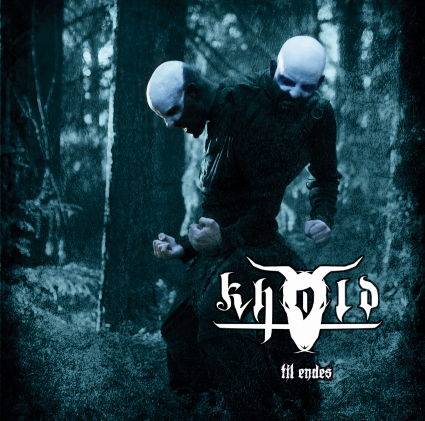
Album Review: Khold - Til Endes
Certain phrases don't appear to make any sense. We hear them, and even without letting our minds pour over the intricacies language can convey, we instinctively know there's something wrong with them. I'm reminded of this as I prepare to listen to Khold's “Til Endes”. The album is described, in the accompanying literature, as 'groove-laden black metal', which is one of those things that doesn't sound like it should be. Black metal is the antithesis of groove, a frosty concoction of pain and misery, with no time or patience for such endearing qualities as 'groove'. Black metal is harsh, and antisocial, while groove is a collective expression. Something about the two seem incompatible, which makes the choice of combining the two odd, to say the least.
“Myr” proves me right on that count, opening with a Down-esque sludgy riff, before black metal vocals come in and make the whole thing sound rather surreal. There is certainly a groove to the main riff, with it's ascending slide that just feels unsettling, and the vocals are pure black metal, but there isn't much synthesis of the two. The riffing takes on a completely different tone when the vocal sections kick in, which seems to defeat the purpose of trying to integrate the two sounds. It would be far more interesting to try to hear the groove underscoring the black metal rasps.
The next couple tracks downplay the groove elements, inching closer to traditional black metal, but without the lo-fi production. These songs are not particularly interesting, since without the attempts at establishing a groove, there is neither a rhythm nor a melody to them that stands out. They are essentially washes of noise, songs constructed out of the parts that should link the meat of them together. Instead, they are left to carry the weight, and they're not enough.
In the middle of the record, Khold stops long enough to cover Sapultura's “Troops Of Doom”, which sticks out in an uncomfortable way. The thrashing nature of the song has enough of a bounce to it that it makes the majority of Khold's attempts to achieve such a thing look weak by comparison. It gets a black metal makeover, but there's plenty of the original poking through to make it an odd fit on the record.
The title track learns a lesson from the cover, with a sinister muted riff that isn't what you would expect from black metal, which is precisely why it works so well. Guitar-wise, it's a nifty track that shows the direction that Khold should have taken. Hearing this different approach is not just unexpected, it introduces a riff that can actually stand on its own and be memorable.
The second half of the record does a better job than the first to get across the point Khold is trying to make, but it's still hard to find much about the record to be interested in. The droning chords and croaked vocals barely move from note to note, and there isn't even a lead guitar or synth to add a melody on top of the music. It's all too simple, and too underdeveloped to merit more than one listen. I wouldn't expect a black metal album to have pop hooks, but there's nothing at all resembling a melody to be found, which is disappointing. This kind of music can work well with sweeping dark melodies. Without even an attempt at them, I don't know what the point of this record really is.

